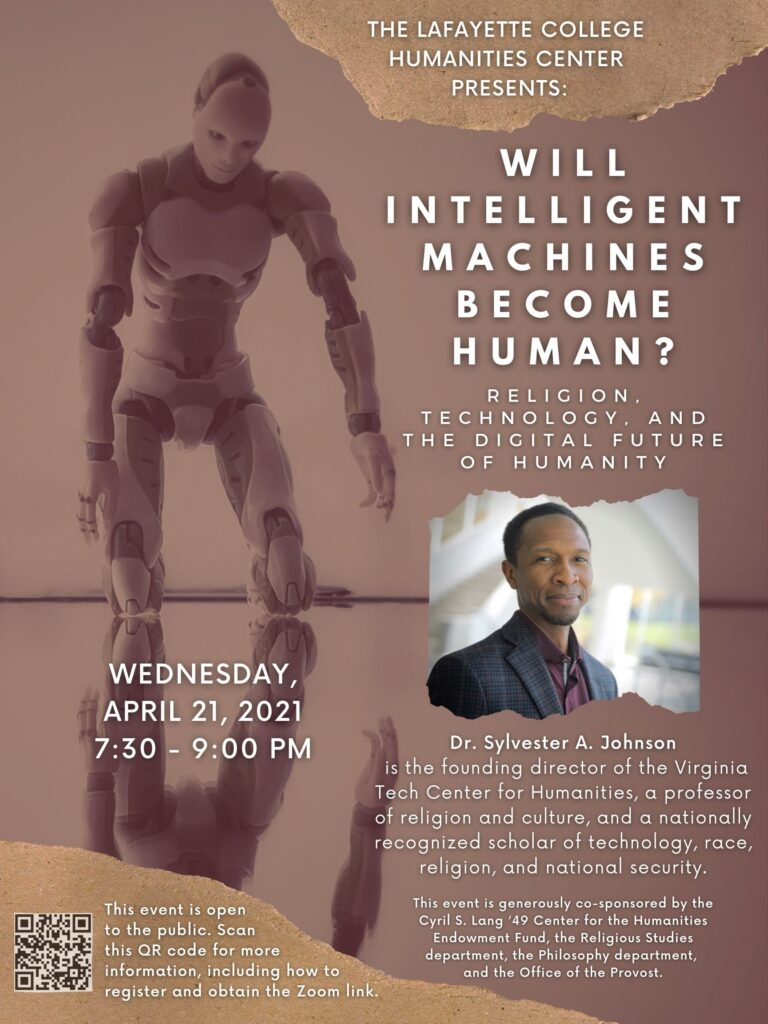Human vs. machine: Who’s more intelligent?
By Stella Katsipoutis-Varkanis
Get ready to take a dive into the world of artificial intelligence. On April 21, Sylvester Johnson—founding director of the Virginia Tech Center for Humanities and a nationally recognized scholar specializing in the study of technology, race, religion, and national security—will deliver a special guest lecture, “Will Intelligent Machines Become Human? Religion, Technology, and the Digital Future of Humanity.”
Why should you mark this event, which is open to the public, on your calendar as a must-see? Here are four great reasons:
The lecture topic—the relationship between artificial intelligence and the human being—could not be timelier.
“… Especially as our nation and world try to work their way out of the current pandemic that has compelled societies to explore and realign our daily lives with new technologies, such as Zoom and Google Meet,” says Eric Ziolkowski, Helen H.P. Manson Professor of the Bible, head of the Department of Religious Studies, and co-leader of the Humanities Center Initiative with Alessandro Giovannelli, associate professor and head of the Department of Philosophy.
In his discussion, Johnson will tackle questions like “Can an assemblage of machine parts be a person?” and “What distinguishes humans from mere objects?” The use of intelligent machines in the form of artificial intelligence or machine-learning applications for human enhancement, Johnson proposes, has crystallized these age-old conundrums in a new key. Johnson’s lecture will explore and explain the consequences of current technology innovation that combine humans with intelligent machines for applications ranging from medical therapy to military super-soldiers.
His talk will “give historical depth to contemporary developments in intelligent machine applications and cybernetics” and discuss “the prospect of new frameworks for humans and non-humans on the horizon, one that promises to expose the limits of the human as a coherent category while creating new possibilities of machine life through automated intelligence and martial technologies,” says Johnson.
It’s a significant opportunity to learn from Johnson, a widely respected scholar in his field.
Johnson’s award-winning scholarship is advancing new approaches to understanding the human condition and social institutions of power in an age of intelligent machines and other forms of technology innovation. From 2014 to 2017, Johnson led a 20-member team of humanists and technologists at Northwestern University to develop a successful proof-of-concept for a machine learning system that could assist in scholarly research of an early English corpus using named-entity recognition and topic-modeling. In 2017, he joined the faculty of Virginia Tech, where he advances research at the intersection of humanity and technology.
He also has authored The Myth of Ham in Nineteenth-Century American Christianity, a study of race and religious hatred that won the American Academy of Religion’s Best First Book award; and African American Religions, 1500-2000, an award-winning interpretation of five centuries of democracy, colonialism, and freedom in the Atlantic world. A founding co-editor of Journal of Africana Religions, he has published more than 70 scholarly articles, essays, and reviews.
“His rare combination of scholarly and administrative gifts, together with his exciting and innovative vision for future directions of humanistic inquiry, make him someone of tremendous value for the Lafayette community to host, see, and hear,” says Ziolkowski.
Johnson’s lecture will appeal to community members across disciplines—on the Lafayette campus and beyond—with humanistic interests.
“The vision of Lafayette’s Humanities Center is driven by the urgent need for bringing humanistic methods of learning and engagement to bear in preparing 21st-century students to confront the intellectual, social, environmental, and existential challenges of a politically fractured but—to a growing extent—technologically interconnected global society,” says Ziolkowski. “The subject of Johnson’s lecture engages directly with some of those challenges.”
You’ll be supporting Lafayette’s Humanities Center.
The establishment of the Humanities Center at Lafayette, Ziolkowski explains, is one of the ambitious academic initiatives President Alison Byerly has introduced. It is Ziolkowski’s hope that the lecture, aside from its inherent value, will help draw attention to the Humanities Center’s commitment to community outreach both at Lafayette and in the city of Easton.
“A lot of energy and work have gone into the planning and implementing of the center,” he says. “Already, with the enormous boost of receiving the Cyril S. Lang ’49 Center for the Humanities Endowment Fund, we have inaugurated a successful faculty grant program to support colleagues’ projects connected to their courses, to foster collaboration between faculty members, and to encourage interdisciplinary undertakings by students. The center was also actively engaged in the second annual Easton Book Festival this past fall.”
The lecture is one of several events that the Humanities Center has arranged for Johnson’s visit. He also will meet with President Byerly, administrators, faculty members of the Humanities Center Steering Committee, and students in Professor Jessica Carr’s class on 20th-century African American religions.
Sponsored by the Humanities Center, Cyril S. Lang ’49 Center for the Humanities Endowment Fund, Religious Studies Department, Philosophy Department, and Office of the Provost, the event has been a year in the making. Johnson’s visit was originally set to take place this time last year before the coronavirus pandemic intervened; however, the Humanities Center was determined to make it happen.
“One of the principles Alessandro and I as co-leaders have sought to instill in the Humanities Center from the start has been a sense of steadfast mission and purpose,” says Ziolkowski. “A nice humanistic principle, traceable back to the ancient stoics: Never give up. COVID may delay the Humanities Center, but it cannot stop it.”
